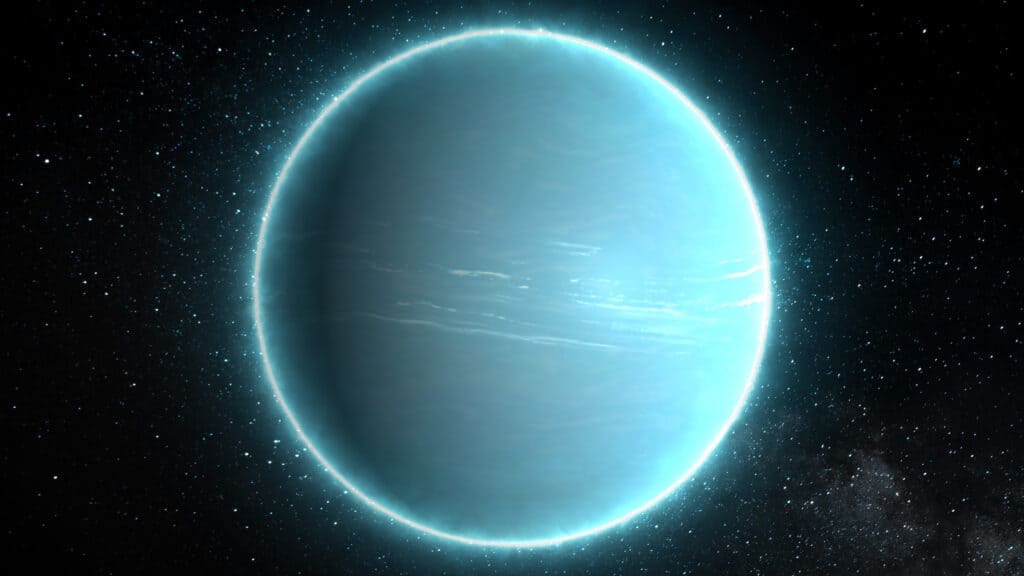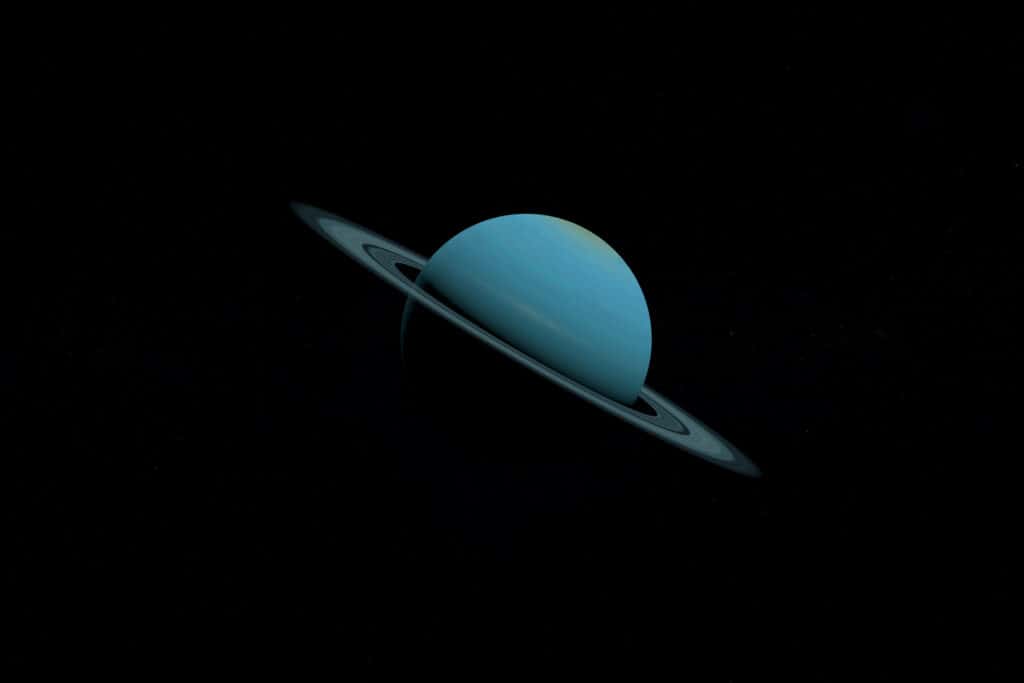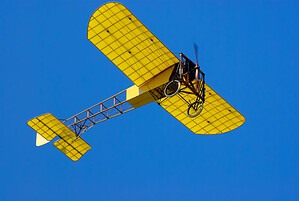A very good jumper can jump less than 9 feet far – about 6 ft 6 in to 8 ft 2.5 in. On the other hand, the average person can jump about 7 ft 5 in. Naturally, the distance that you can jump is influenced by many things, such as the speed before the jump and muscle strength.
Speed and strength can be directly changed by the jumper. However, there’s one thing that cannot be changed that easily. That thing is gravity, something experienced on all planets. Earth’s gravity is known as normal gravity and measures 1g – about 32.2 ft/sec2 of acceleration. This value is different on every planet in our Solar System.
In this article, we’ll see how far you could jump and how strong you’d be on the surface of Uranus, one of the ice giants revolving around our Sun.
What factors influence the distance of a long jump?

Gravity affects the acceleration that one can have before and after jumping.
©iStock.com/IncrediVFX
The distance of a long jump is influenced primarily by vertical velocity during take-off and horizontal velocity developed in the run-up.
The equation to determine jump distance takes into account several values such as take-off angle, acceleration due to gravity, take-off velocity, and so on. Most of these values are constants – at least here, on Earth. For this particular purpose, we’ll consider professional jumpers only, as they have a constant take-off height. People jump differently, so a child or a casual jumper would experience different or inaccurate results if the equation in question is applied.
Nevertheless, horizontal and vertical matter – or do they? How much do they influence jump distance (and height) when exposed to the surface of Uranus?
What is the exact gravity on Uranus?

The exact gravity on the surface of Uranus is 0.886 g.
©iStock.com/Ianm35
The exact gravity on the surface of Uranus is 28.51 ft/sec2 – or 0.886 g. It is about 89% the gravity of Earth – or 11% weaker. A 10 lbs object on Earth would weigh about 8.8 lbs on Uranus. This value influences the weight of objects (not their mass), your ability to jump, as well as your overall strength.
Uranus is one of the planets with a gravity very similar to ours. As a result, jumping on it (vertically or horizontally) won’t have significantly different results. At the same time, objects lose only a fraction of their weight, so you wouldn’t necessarily be more powerful on Uranus.
For comparison purposes, the gravity on the Moon is 5.31 ft/s2 – or 0.166 g. It is about 16% the gravity of Earth – or 84% weaker. You can refer to the famous moon walking videos to get an idea and a starting point for the matters in question here.
How far and high could you jump on the surface of Uranus?
In theory, on Uranus, you could jump approximately 1.80 ft high from a standing position and spend 0.70 seconds in the air. On Earth, you can jump about 1.64 ft high and spend 0.63 seconds airborne. This means that, on Uranus, you can jump about 1.1 times as high and far away.
The mass of Uranus is about 14.5 Earths, an aspect that directly influences the gravity on this planet. There, building up speed is similar and as effortless as on Earth. Taking numbers into account, you’d experience about 11% improvement.
In theory, according to the data presented here, you could jump approximately 97.9 inches far on the surface of Uranus – about 110% of an approximate average 7 ft 5 in (89 inches) jump on Earth. On our planet, this would make you a very good jumper.
How far and high could you jump on the surface of every planet in our Solar System?
Here is how far and how high you could jump on the surface of every planet in our Solar System:
| Jump height (approx.) | Jump distance (approx.) | |
|---|---|---|
| Earth | 1.64 feet | 89 inches |
| Mercury | 4.33 feet | 234 inches |
| Venus | 1.80 feet | 97.9 inches |
| Mars | 4.33 feet | 234 inches |
| Jupiter | 0.62 feet | 34.7 inches |
| Saturn | 1.54 feet | 82.77 inches |
| Uranus | 1.80 feet | 97.9 inches |
| Neptune | 1.41 feet | 77.43 inches |
| Pluto | 24.34 feet | 1,406.2 inches |
How strong would you be on the surface of Uranus?
In theory, you’d be 1.1 times as strong on the surface of Uranus. On the planet’s surface, 10 lbs feel like 8.8 lbs. The greatest weight ever lifted, 6,270 lbs, would weigh only about 5,555.2 lbs on Uranus.
Object mass must be taken into account as well. The bigger the mass of an object is, the more difficult it will be to pick up, regardless of weight and gravity. For example, even in 1% gravity, you couldn’t pick up a mountain. In short, the weight changes, but the mass doesn’t.
Compared to Earth, differences wouldn’t be drastic on Uranus, as the planet has a gravitational force that’s only 11% weaker than Earth’s. You’d be a little stronger and jump a little further if you lived there.
What planet could you jump the farthest and be the strongest on?
You’d be the strongest and jump the farthest on Pluto. The planet’s gravity is only 0.063 g – about 6% of the Earth’s gravity. After jumping on the surface of Pluto, you’d be airborne for about 10 seconds before falling back down to its surface.
Here’s Uranus compared to other planets!
| Planet | Volume | Mass | Surface Gravity | Escape velocity | Average surface temperature |
|---|---|---|---|---|---|
| Uranus | 63.086 Earths | 14.536 Earths | 0.886 g | 13.24 mi/s | -353 °F |
| Mars | 0.151 Earths | 0.107 Earths | 0.3794 g | 3.12 mi/s | -81 °F |
| Neptune | 57.74 Earths | 17.147 Earths | 1.14 g | 14.6 mi/s | -373 °F |
| Jupiter | 1.321 Earths | 317.8 Earths | 2.528 g | 37.0 mi/s | -238 °F |
| Saturn | 763.59 Earths | 95.159 Earths | 1.065 g | 22 mi/s | -285 °F |
| Venus | 0.857 Earths | 0.815 Earths | 0.904 g | 6.44 mi/s | 847 °F |
| Pluto | 0.00651 Earths | 0.00218 Earths | 0.063 g | 0.75 mi/s | -375 °F |
| Mercury | 0.056 Earths | 0.055 Earths | 0.38 g | 2.64 mi/s | 354 °F |
| Earth | 2.59876×1011 cu mi | 1.31668×1025 lb | 1 g | 6.95 mi/s | 57 °F |
Up Next:
- See How Far You Could Jump, and How Strong You’d Be On The Surface of Saturn
- This is How Cold The Surface of Uranus Really is, And What Could Survive There
- This Is How Much You’d Weigh On Uranus
- Discover the Largest Black Hole Ever Found in the Known Universe
The photo featured at the top of this post is © iStock.com/Ianm35
Sources
- Cosmos, Available here: https://cosmos-book.github.io/high-jump/index.html
- ScienceDirect, Available here: https://www.sciencedirect.com/science/article/pii/S1877705813011260?ref=pdf_download&fr=RR-2&rr=74b204b50e401a1b
Thank you for reading! Have some feedback for us? Contact the AZ Animals editorial team.







